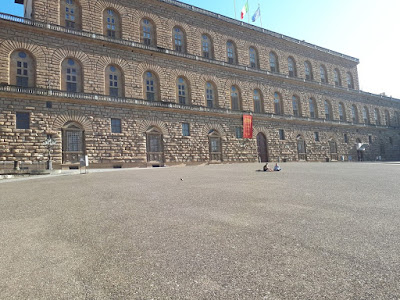What I find most impressive in Florence, nowadays, is the silence. Maybe it was too noisy before. Maybe there were too many tourists, too many pizza restaurants, too many buses, too many cars, too many things.
But now it is spectral. Two lone tourists in the large Pitti square. A playground without children. The only sign of life in a back road is the laundry at one of the windows. There are people inside the buildings, but nearly no one in the streets.
It is a ghostly feeling. It is not so much that people have disappeared. You can still see Florentines walking around. Some are terrified and walk close to the walls of the buildings, afraid even to look at other people's eyes. Others seem to be more carefree, with the summer, many seem to have had enough of their face masks. But the town is frozen in the expectation that everything will return as before, that the restaurants will reopen, that the tourists will come again, that the museums and the shops will be full again.
It won't happen. Florence will have to find another way to exist, to survive, perhaps even to prosper. But, for now, it remains stuck in the memory of a time that will not come back. Like a ghost hovering around.
It brought back to my mind a poem by Giovanni Pascoli, an eerie story based on an old Tuscan legend. It is said that if you forget to take off the tablecloth after dinner, the dead will come during the night and sit at the table, trying to remember the old times, when they were alive.
The Tablecloth -- Giovanni Pascoli (1907) They come in, panting silently.
Everyone is ever so tired!
And they stop to sit
the whole night around that white cloth.
They stay there until the morrow,
with their head between their hands,
without making any noise,
under the extinguished lamp.From evening to morning,
looking for remote things,
they stay there, with bowed foreheads,
on some crumbs of bread,
and wanting to remember,
they drink bitter tears.
Oh! the dead don't remember,
the dear ones, the dear dead!
- Bread, yes ... it is called bread,
that we broke together:
remember? ... It is cloth, checkered:
there were so many things: do you remember? ...
These? ... These are two,
like yours and yours,
two of our bitter tears
fallen in remembering!
La Tovaglia -- di Giovanni Pascoli (1907)
Le dicevano: ― Bambina!
che tu non lasci mai stesa,
dalla sera alla mattina,
ma porta dove l’hai presa,
la tovaglia bianca, appena
ch’è terminata la cena!
Bada, che vengono i morti!
i tristi, i pallidi morti!
Entrano, ansimano muti.
Ognuno è tanto mai stanco!
E si fermano seduti
la notte attorno a quel bianco.
Stanno lì sino al domani,
col capo tra le due mani,
senza che nulla si senta,
sotto la lampada spenta.
È già grande la bambina;
la casa regge, e lavora:
fa il bucato e la cucina,
fa tutto al modo d’allora.
Pensa a tutto, ma non pensa
a sparecchiare la mensa.
Lascia che vengano i morti,
i buoni, i poveri morti.
Oh! la notte nera nera,
di vento, d’acqua, di neve,
lascia ch’entrino da sera,
col loro anelito lieve;
che alla mensa torno torno
riposino fino a giorno,
cercando fatti lontani
col capo tra le due mani.
Dalla sera alla mattina,
cercando cose lontane,
stanno fissi, a fronte china,
su qualche bricia di pane,
e volendo ricordare,
bevono lagrime amare.
Oh! non ricordano i morti,
i cari, i cari suoi morti!
― Pane, sì... pane si chiama,
che noi spezzammo concordi:
ricordate?... È tela, a dama:
ce n’era tanta: ricordi?...
Queste?... Queste sono due,
come le vostre e le tue,
due nostre lagrime amare
cadute nel ricordare! ―



